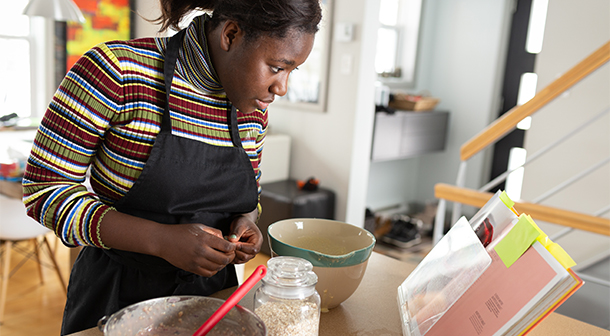Helping Your Teen Become an Adult
By Kristen Duke
11 minute read
As parents, we all want what's best for our kids. That feeling doesn't ever go away. In fact, it can even get stronger as kids become more independent and start their transition into adulthood. Helping our kids become responsible adults is one of our biggest challenges and most rewarding gifts. Parenting teenagers takes patience, consistency, discipline, and love.
A teenager is a person between the ages of 13 and 19. A lot of parents are terrified of the teen years. It's true that there are many challenges for teens and parents, but when you're parenting teenagers there are also so many things to look forward to. It's important to be patient during this time - with them and yourself - and do your best to model for your teens the behaviors you want them to adopt and the responsibilities you want them meet.
And remember, you aren't the only one who is intimidated! The process of changing into an adult can cause a lot of anxiety in teenagers. The teenage brain is changing, and that can be a confusing thing for him (or her). It's important that as a parent, you give him grace where you can. But be firm and consistent when teaching responsibility and life skills that will prepare him for life after high school.

Parenting Teenagers
Patience is so important when you're dealing with teenagers. Some days you'll have an angry teenager, other days a defiant teenager. Teenage attitudes can change day by day, minute by minute. Remember, as the adult, you have to be more understanding of your teen's emotional outbursts and know it's not personal. Though your teen may direct his frustrations at you, it's likely because you're a safe place to turn to and you give him a soft place to land.
When kids become teens, it's important to teach responsibility by letting them manage basic life skills. For example, it's important for a teenager to learn cooking and cleaning - appropriate teenage chores. It's also an important time to give him his own space to express his freedom and individuality. He may express this in the way he decorates his bedroom, in the clothes he wears (within reason), and how he does his hair.
I've often heard that the goal of a parent is to “get worked out of a job.” This phrase means that our job, as parents, is to raise kids to be so independent and confident that they don't rely on us for daily direction and support, even if that's a little heartbreaking for us to think about. I want to train my children to be independent, and I want to give them life skills that will lay the foundation for a successful and fulfilling life.
I made a list of important life skills that I want to share. This checklist is meant to help us as parents teach life skills to our teenagers and prepare them for becoming an adult.
Need parenting help now?
The Texas Parent Helpline is available 24/7.
- Call 833-680-0611
- Chat with us
- Text 833-680-0611

Important Life Skills
Cooking
Cooking is one of the most essential of life skills. Parents should teach their teen how to take a meal from start to finish - and not just one! After all, it's important for teens to learn more than how to cook a hamburger or chop vegetables. Start with the very beginning - this includes how to read and follow a recipe - and make sure he follows the process all the way through cleanup. I thought I prepared my oldest child well since I always had my kids help in the kitchen. When he moved away, he claimed he “never learned how to cook.” That's when I realized the importance of teaching a teenager how to follow a recipe from start to finish.

Managing Money
Managing money is the most important life skill to teach your teenager. It's never too early to start teaching them how to manage money. For example, little ones can learn how to save their quarters to buy ice cream or a favorite snack. Parents should help their teen set up a bank account and show them how to use a debit card (with supervision). It's also important for teens to understand the different ways they can make money. You can do this by assigning optional teenage chores or helping them look for relevant jobs for teens. Having their own money also allows them to buy things teens want.
Laundry
Laundry is something kids can do on their own by age 10. Really! This is surprising to many parents. Start by teaching your teen how to divide colors and which clothes to wash on hot and which are better washed cold. Teenage chores can include washing his own clothes, folding clothes, ironing, and keeping dirty clothes in a laundry bin instead of on the floor. This is a simple but often overlooked independent living skill. When teens live with roommates, and maybe one day a spouse, everyone will benefit from these life skills that were instilled and learned early.

Social Skills and Manners
Social skills and manners are also important. I'm talking less about putting elbows on the table and more about responding in a conversation. Teens are growing up in the digital age and having less and less in-person interaction, so it's becoming more important to discuss how to have face-to-face conversations. A common challenge for teenagers is a natural understanding of appropriate social behavior. This includes not interrupting, looking people in the eye when speaking, practicing active listening, and other basic behaviors. Teens talk through text most of the time and aren't communicating face-to-face as much as we did when we were teenagers, so they just don't have as much practice!
Behavior Skills
Behavior skills should not be overlooked. It's hard to know how to address the rebellious teen eye-rolling, door slamming, or backtalking. Do we ignore it? Enforce a consequence? How do you deal with teenagers who are making a poor choice by acting impulsively? How do you handle a rebellious teenager in general? My favorite method as a parent of several teens is to take a deep breath, offer grace, and invite them to try again. When parenting teenagers, it's hard to keep our own emotions from getting involved. Pause for a moment and remember that teenagers are trying to figure out life and need our understanding most of all.
Of course, a disrespectful, foul-mouthed, or out-of-control teenager needs to be addressed immediately. Otherwise, allow your teen to try again. All teenagers will make mistakes. Self-management is an important part of becoming an adult, so it's a skill they'll have to grow into. By inviting your teen to try again you're helping him practice and learn how to self-manage his anxiety, frustration, or anger so he can make better choices the next time.
Organization and Time Management
Organization and time management are great life skills for teens to learn. The best way to teach time management is to set clear, daily expectations. Life means lots of juggling! Adult responsibilities will be overwhelming to a teenager if he doesn't learn how to manage multiple tasks. Encourage your teen to keep some sort of planner - digital or paper - with a list of to-do's to help stay organized. A list helps teenagers learn time management, and it also gives them the satisfaction of crossing off tasks as they finish them. Once your teen has a list, encourage him to rank to-do's from most important to least important. This will help him learn how to prioritize and create a schedule when managing multiple responsibilities. These self-management skills will come in handy for life after high school.

Coping with Emotions and Personal Challenges
Helping our teens learn to problem-solve on their own helps them live independently. As parents, we often want to do everything we can to make life easy for our kids or ease their pain, but the reality is that they need to learn that sometimes life isn't fair and hard times will come. Teenagers need to figure out healthy ways to identify and solve their own problems. When appropriate, stand back and let them fail so they can pick themselves back up again. Teaching responsibility means letting teenagers make mistakes and then learn from them. Just let them know you're there for support and available to talk when they need to.
Car Safety
So many teens these days are putting off getting their driver's license, but driving is a helpful life skill in most areas of Texas. So, if you can be involved and encouraging in the process, don't hesitate! Some parents want and choose to be their teen's driver's ed teacher. If this is you, go for it! Being a part of the process allows you to closely monitor and help instill safe driving skills in your teen. If this doesn't appeal to you, you can still help demonstrate how to be a safe and defensive driver by being a good model for your teen. Remember, teenagers and parents should have patience while driving. Avoid digital distractions and obey all traffic laws, such as always using a blinker. And don't forget to remind your teen to always use his seat belt and to require anyone in the car with him to use theirs as well.

Setting Realistic Goals
Sometimes you'll see anxiety in teenagers that's caused by all of their schoolwork and extracurricular activities. Not only are they dealing with day-to-day teenager things, but many are planning for the future and have high expectations they want to live up to. Teens put pressure on themselves, but parents and teachers contribute to that pressure as well. Try to make time to sit down with your teen and set realistic goals by discussing how they're doing. Talk about accomplishments, ask what challenges your teen is facing socially, physically, or emotionally, and try to get a sense of your teen's mental health. By helping him think through his accomplishments, challenges, and health, you're teaching important life skills of self-care and goal-setting.
Decision-Making and Consequences
Think about the house rules that have been set. Is the list long or is it just a few very important ones? In our home, we have a list of expectations with wiggle room for mistakes, and we also have a short list of rules that have consequences attached. Rules and expectations are not the same thing.
Expectations are the daily requirements and responsibilities we expect of our kids, while rules have consequences when they are broken. Choose rules thoughtfully. If there are too many rules and consequences, a teen can feel overwhelmed and become a defiant teenager. The last thing a parent wants is a rebellious teenager.
Teenagers and parents should discuss the things that are most important, such as curfew, safety, and driving rules. Include any that are non-negotiable. Discuss in advance what the consequences are for breaking those rules, and follow through with the consequence when a rule is broken. For example, in our house, keeping a clean room and helping with the dishes after dinner are expectations, not rules. Making curfew is a rule. Mistakes happen, so parents should pick and choose the battles that really matter and require consequences. Discussing and defining the rules and expectations can help with how to deal with teenagers during these challenging times.
Time for Your Teen to Drive
Preparing for Life After High School
While teenagers are living at home, it's important to discuss what they should expect for life after high school. It can be helpful for you to share examples of what you thought college (if you went to college) or living on your own would be like, and then what actually happened. Encourage them to talk to other family members or family friends about their experiences going from living at home to moving out on their own. The more examples your teen hears about life after high school the better prepared for college or living on his own he will be.

Preparing for College/Trade School
Not all kids want or are able to attend college. This is a decision that you should discuss with your teen, and something that needs to happen early in your teen's high school years. It can also be helpful to talk to teachers and counselors about a direction that is most appropriate. Encouraging your teen to interview adults who work in a variety of fields is a great way for him to learn about possible jobs he might find interesting. Asking adults other than Mom and Dad to provide teenage advice can be extremely helpful. My son thought he wanted to be a doctor, but after interviewing a variety of doctors he decided that it may not be the career course he wants to take. I love that he took the opportunity to plan those interviews (mostly phone calls) so he could better understand what that job would entail.
Preparing/Applying for a Job
One big step in a teenager becoming an adult is creating a resume. The first step is helping them recognize their skills and accomplishments. Next your teen will need to find a resume template that works best for their needs. There are lots of free online options. Writing a resume is an important life skill and it can be a great time to bond. Discuss their strengths, volunteer work, and awards. Putting accomplishments down on paper is also a good opportunity for parents to recognize a teen's achievements, and a time for your teen to be proud of what they have done.
Another important life skill is knowing how to interview for a job. Teenagers and parents can practice what a job interview would be like and role play different scenarios and questions that might be asked. Discuss the process with your teen and how he can make a good first impression. He should practice active listening, maintain good eye contact, and dress for the job he wants. Knowing how to interview is an essential life skill.
Teenagers and Parents Working Together
I hope this list of ideas is useful as you help your teen learn important life skills that will help set them up for success. Teaching these essential life skills may feel like a lot at first glance - but hang in there. Parenting teenagers is difficult in many ways, but it's also rewarding as you watch them successfully deal with teenage problems. Following these tips will help both teenagers and parents feel more secure. And don't forget to routinely touch base for a teenager and parent check-in. Try to keep your ears and arms open for both the challenging and celebratory times. Raising teenagers and teaching responsibility isn't easy, so take it one day at a time!





